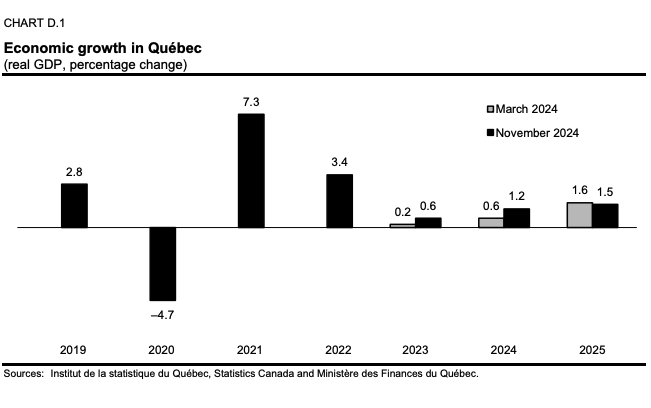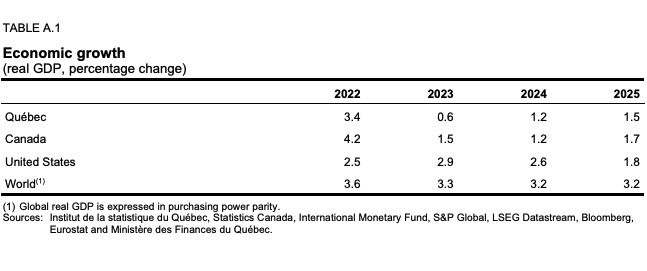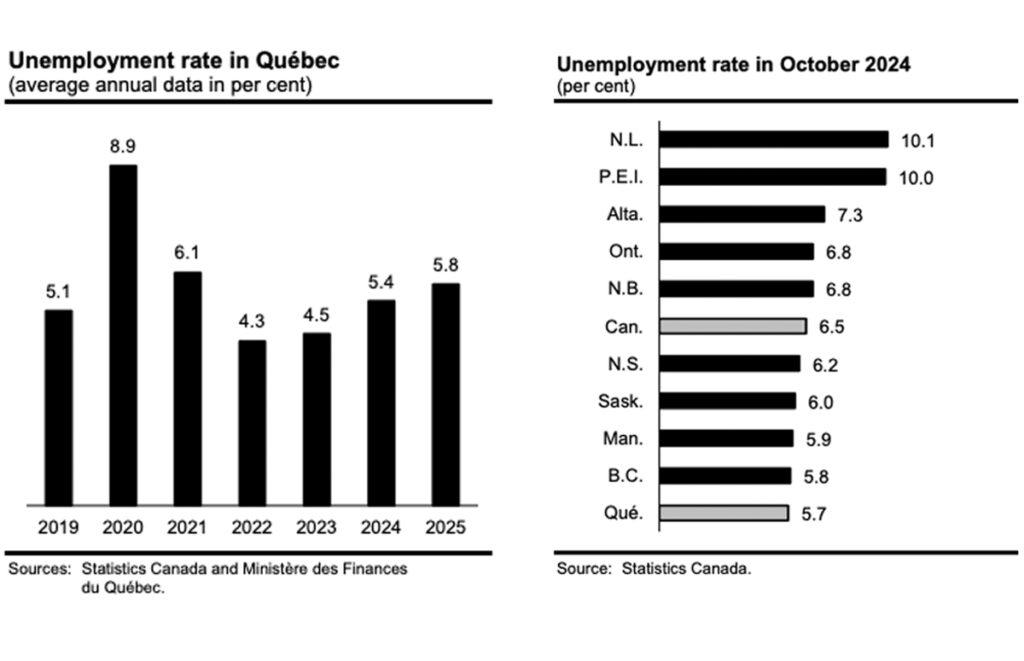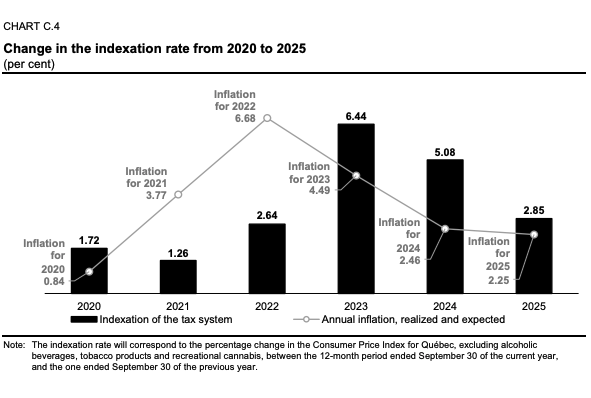On Thursday, Quebec’s Minister of Finance, Éric Girard, delivered the annual fall economic and fiscal update at the National Assembly.
The economic update included new investments of $2.1 billion over five years for priority areas of Quebec’s economy such as forestry, access to housing, public safety, and public transportation. Girard insisted that ministers must respect the budgetary measures aimed at reducing spending, and confirmed that the government has maintained a track for a deficit of $11 billion, as announced in the 2024 budget this past spring. However, the deficit for the 2025-2026 financial year could see an increase of $700 million, bringing projections to $9.2 billion.
Quebec’s national economy is on a path to growth
Following a downturn in 2023, Quebec’s economy has started to rebound. Real GDP growth is expected to reach 1.2% in 2024, a notable increase following projections of 0.6% in the budget earlier this year. In 2025, GDP growth is expected to continue, reaching 1.5%. That said, the Minister of Finance has warned that future economic growth could be hampered by a reduction in the number of non-permanent residents.

The growth trends observed in Quebec are consistent with the trajectory of the Canadian economy’s GDP for the 2024 fiscal year. However, in 2025 the Canadian economy could surpass Quebec’s growth by a slight margin, while the American economy could experience a decline.

Tight job market, despite lower unemployment rates than the rest of Canada
The fiscal update reported that Quebec’s job market is showing signs of slowing since the beginning of 2024, due to the impact of restrictive monetary policy on demand for labour. Labour supply, driven by a strong population increase, experienced a notable bump: the labour force grew by 1.3% on average in 2024, surpassing the number of jobs created, which was estimated at just 0.4%. This evolution could also lead to an increase in the unemployment rate, pushing it to 5.4% in 2024 compared with 4.5% in 2023. This relative cooling of the labour market could also lead to slower wage growth. That’s said, unemployment in Quebec remains below the national average, with a rate of 5.7% in October 2024, compared to 6.5% for Canada as a whole.

Inflation on the decline
Inflationary pressures have eased in Quebec, parallel to tendencies observed at the global scale. According to the Finance Minister, inflation decreased from 3.3% in January, to 1.3% in September. It is projected that the inflation rate for the 2024 fiscal year could reach 2.46%, a notable reduction from 4.49% in 2023. This trend could continue into 2025, with inflation predicted to reach 2.25%. Together with low interest rates, this is expected to support the forecasted economic growth in the next fiscal year.

Spending on the rise
Portfolio expenditures exceeded expectations this year, rising by $2.9 billion compared to the projections outlined in the 2024-2025 budget. This increase is attributed to $365 million in new initiatives announced since the spring, including revisions to the health and social services portfolio as well as the delays in the completion of infrastructure, mainly related to public transit, local infrastructure projects, higher education facilities and subsidized housing.
While domestic demand and household spending were key drivers of economic growth in 2024, non-residential business investment is expected to regain momentum in 2025. This will mark the first period of recovery in the area since 2021. Factors contributing to the anticipated increase include reduced interest rates, major projects in the mining and battery sectors, improved business confidence and investments driven by the transition to a low-carbon economy.
New investments in priority sectors
To support key sectors, Minister Girard announced $2.1 billion in new targeted investments, including:
$252 million to increase support for the forestry sector. This increase brings total planned support over the next few years to a value of $540 million, including $100 million for financial assistance from loans and $440 million for investment in reforestation efforts. Minister Girard emphasized the importance of the forestry sector for Québec’s economy:
The forestry sector plays a key role in Quebec’s economy and regional development. The initiatives we are announcing today bring the total of sums invested by our government to support the sector to $1 billion since the fall of 2023.
– Eric Girard, Minister of Finance and Minister Responsible for Relations with English-Speaking Quebecers
$218 million to consolidate support for Quebecers, by promoting access to housing and improving support for recipients of social assistance.
$433M to ensure the safety of communities. These measures include additional funding to ensure the safety of communities impacted by flooding, improving cellular coverage and honouring police coverage obligations in Nunavik.
$1.2B to foster community development. Public transit services will remain a priority for the government. Nearly $880 million, representing much of the $1.2 billion investment, will be allocated to the five-year plan to support public transit. The government is also announcing an investment of $300 million over the next four years to contribute to the vitality of Montréal and the Capitale-Nationale.
What’s next?
Premier Legault must announce a by-election in Terrebonne, which has yet to take place following former ‘super-minister’ Pierre Fitzgibbon’s resignation. Under the law, a by-election must be called within six months, meaning it must occur by March 2025. The Parti Québécois maintains their lead in the polls, and has called for the by-election to be triggered as soon as possible. The PQ has nominated Catherine Gentilcore as their candidate in the riding. The other parties have also selected their candidates. The riding of Terrebonne was taken over in 2018 by Fitzgibbon after having been a PQ stronghold since the 1970s. This will be another test for the CAQ following their defeat in Jean-Talon.
François Legault is the 32nd premier of Québec. By the time the next general election rolls around, his mandate will have lasted almost eight years. Only six Québec premiers have held office for more than two terms, which would mean that if François Legault is re-elected in the fall of 2026, he could overtake René Lévesque and Jean Charest in the ranking of the longest-serving premiers of the province.


